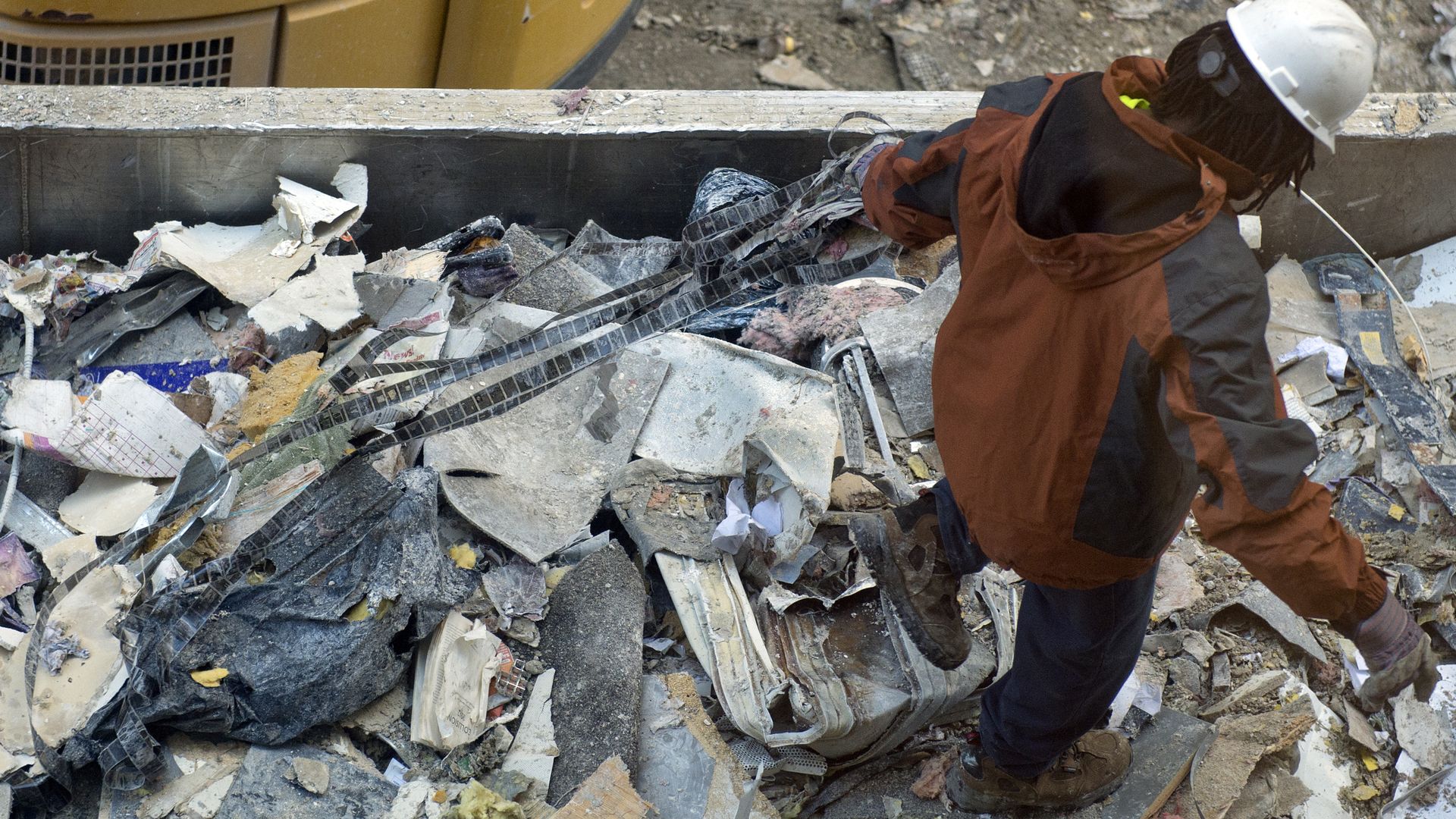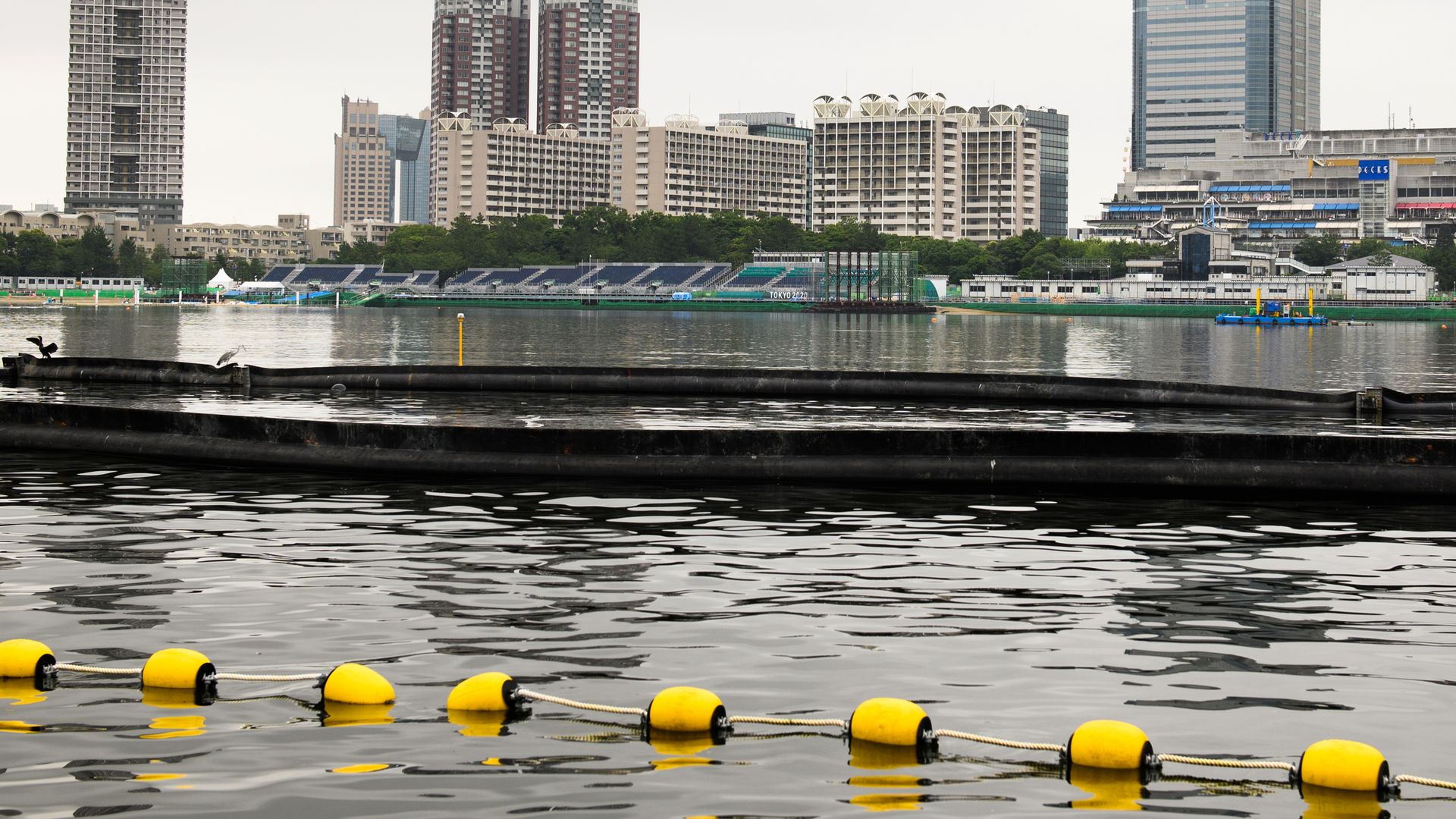| | | | | | | Presented By General Motors | | | | Axios What's Next | | By Bryan Walsh, Erica Pandey and Joann Muller ·Jul 15, 2021 | | Today we're examining how cities sell themselves to remote workers, how to meter urban trash with AI and why the Olympic triathlon just got stinkier. "What was next" trivia: On this day in 1993, the first U.S. death was caused by what kind of insect? - Credit to reader Philip Bianci for being the first to note that the outlaw Billy the Kid was killed on July 14, 1881. And here's that Billy Joel song.
- Send your answer, along with tips and feedback, to whatsnext@axios.com.
🚨Join Axios' Erica Pandey today at 12:30pm ET for a virtual event on the future of education. Guests include Rep. Chrissy Houlahan (D-Pa.) and Khan Academy founder and CEO Sal Khan. Register here. Today's Smart Brevity count: 1,251 words ... 4.5 minutes. | | | | | | 1 big thing: The rise of municipal marketing |  | | | Illustration: Shoshana Gordon/Axios | | | | Chicago touts a diverse workforce. Morgantown, West Virginia, promises outdoor activities galore. Savannah, Georgia, advertises its historic charm. Indianapolis is proud of its small-town feel, writes Kim Hart. Why it matters: The post-pandemic workforce reshuffling has given cities and towns a new opportunity — and a new mandate — to market themselves with glitzy ad campaigns and worker recruiting trips, putting a new spin on the conventional municipal economic development playbook. Between the lines: Instead of trying to attract big companies with tax incentives to bring a new headquarters or manufacturing plant (along with hundreds of new jobs) to town, city leaders are looking for the "micro-talent" — the individual who already has a job somewhere else but is looking for a better place to live. - Convince enough people to move to a particular city, and that city suddenly has a new worker ecosystem that can grow organically without having to dole out multimillion-dollar tax breaks to lure corporations.
- Building out the social and physical infrastructure needed for remote workers — like co-working spaces, restaurants and other urban amenities and faster broadband — can help stimulate local economies.
What's new: Last week, a delegation of Chicago city leaders and serial tech entrepreneurs headed to San Francisco to meet with Chicago natives who'd moved west to pursue their tech careers, with the hopes of luring some of them back. - "We've got a lot of very strong, innovative tech entrepreneurs that are setting the world on fire," Chicago Mayor Lori Lightfoot told Axios from California. "We've got to do a better job of telling that story, both internally within Chicago, but really to the nation and to the world. Chicago is very much in the mix and has a lot of momentum."
Marketing 101 involves touting big wins. Like colleges that advertise their title teams to potential applicants, pro sports teams winning championships helps cities become top of mind for people who might be looking to relocate. - "That gets a lot of eyeballs and gets us on the map," said Jeffrey Vinik, owner of the Tampa Bay Lightning, which won the Stanley Cup last week, just a few months after the Tampa Bay Buccaneers took the Super Bowl. #ChampaBay has been trending on social media.
- Vinik, a longtime investor based in Tampa, spearheaded the focus on attracting knowledge workers to the area about five years ago, establishing an entrepreneur support center and trying to raise the city's profile.
- "I think it helps to have a spark," to energize a community and get people talking, Vinik told Axios. "I truly believe that in the next 10-20 years, the region from Tampa Bay to Orlando all the way to the Space Coast is going to explode. The message to people is, 'get in on it now.'"
Read the rest. |     | | | | | | 2. Using AI — and dumpster cameras — to better manage urban trash |  | | | A sanitation worker sifts through a dumpster in Washington, D.C. Photo: Tom Williams/CQ Roll Call | | | | A startup called Compology is using high-tech cameras in dumpsters and AI analytics to help companies and cities better manage their waste streams, writes Bryan Walsh. Why it matters: Trash — unlike electricity or water — isn't easy for cities to meter, "which contributes to the inefficiency around waste management," says Jason Gates, Compology's CEO. - By tracking exactly how much and what kind of waste is in a dumpster, Compology enables its customer to cut down on unneeded pickups and improve recycling rates.
What they're saying: "Waste and recycling is the only utility that doesn't have any form of measurement, because everything is based off estimates," says Gates. "Not only does that mean unnecessary vehicle miles emitting carbon, but businesses and taxpayers end up paying for trash service that they don't actually need." How it works: Compology installs military-grade cameras in large dumpsters that take pictures of the contents roughly five times a day. - Those images get sent back to an AI system that uses image recognition to identify how full the dumpster is and what kind of trash is contained inside.
- Pickup schedules can be more efficiently timed to when the trash really is full, while the AI system "can determine that you're putting Amazon boxes in a landfill garbage container and push out a message to move that cardboard into your recycling container," says Gates.
By the numbers: A sanitation company in California's Alameda County that partnered with Compology was able to reduce waste management costs by 20% and recycling contamination by 80%. Read the rest. |     | | | | | | 3. GPS for a 3D world |  | | | A photo illustration of what aerial drones using 3D mapping might look like. Credit: NextNav | | | | Digital maps are getting better every day, making turn-by-turn navigation more accurate, with real-time details. Adding a third dimension to mapping — altitude — is the next breakthrough, writes Joann Muller. Why it matters: Satellite-based GPS maps are critical to modern life but have their limitations. They don't work well indoors or in urban areas, and they aren't secure. - 3D maps could improve location accuracy by telling a delivery person — or emergency responder — what floor you're on, for example, or by locating your car in a multistory garage.
- Drones will also need 3D maps to navigate between tall buildings.
What's happening: NextNav, based in Sunnyvale, California, is among the companies working on the next generation of 3D mapping. - Its Pinnacle vertical location service is available in more than 4,400 cities across the U.S. — covering 90% of multistory buildings in America, according to the company.
How it works: NextNav's tech leverages the barometric sensors already available in smartphones, tablets and other devices to determine "floor-level" altitude within three meters. - Companies can integrate NextNav's tech into existing apps, enabling communication with its proprietary network of altitude sensors.
"Think of us as the blue dot that goes hand in hand with mapping," CEO Ganesh Pattabiraman tells Axios. - "Today's blue dot comes from GPS and some Wi-Fi. But it's not reliable enough. What we bring is a blue dot, which is based on a land-based device that transmits an encrypted GPS-like signal, which is so much stronger than GPS."
Read the rest. |     | | | | | | A message from General Motors | | Progress moves when everybody's in | | |  | | | | General Motors is investing $35 billion globally in EVs and AVs through 2025 and providing access to nearly 60,000 places to charge across the U.S. and Canada. Why it's important: By creating a seamless charging experience, GM's investment is electrifying the future. | | | | | | 4. Unpacking the newest temperature data |  Data: NOAA; Chart: Will Chase/Axios June was the Earth's fifth-warmest such month on record, according to new data released Tuesday by the National Oceanic and Atmospheric Administration (NOAA), writes Andrew Freedman. The big picture: Land surface temperatures were the hottest they've been during the month, dating back 142 years of instrument record-keeping, but ocean temperatures didn't rank quite so highly. Read the rest. |     | | | | | | 5. 1 Olympic thing: A triathlon in a "toilet" |  | | | Tokyo Bay, where part of the Olympic triathlon event is set to be held despite lingering concerns about pollution. Photo: Akio Kon/Bloomberg via Getty Images | | | | With just days to go before the Games begin, Bloomberg reports that concerns are growing about pollution levels in Tokyo Bay, where the swimming portion of the triathlon is set to take place, writes Bryan. What's happening: A test for the swimming part of the Paratriathlon in the bay was canceled in August 2019 after E. coli bacteria was found at more than twice the limit set by triathlon officials — and after one athlete reportedly said the bay "smelled like a toilet." - But despite the efforts of organizers — which included dumping 22,000 cubic meters of sand in the bay and designing polyester screens to protect the venue from bacteria — residents have noticed a pungent smell coming off the bay in recent weeks.
By the numbers: Wastewater and sewage from Tokyo's 30 million residents, combined with runoff from multiple rivers and canals, all have to be treated before flowing into Tokyo Bay. The bottom line: Water pollution is a fact of life for triathletes who compete in events in large cities, which means that arguably the most arduous Olympic event will simply involve a slightly higher — and smellier — degree of difficulty. |     | | | | | | A message from General Motors | | Progress moves when everybody's in | | |  | | | | General Motors is investing $35 billion globally in EVs and AVs through 2025 and providing access to nearly 60,000 places to charge across the U.S. and Canada. Why it's important: By creating a seamless charging experience, GM's investment is electrifying the future. | | | | Thanks for reading! If this email was forwarded to you, subscribe here! |  | | It'll help you deliver employee communications more effectively. | | | | | | Axios thanks our partners for supporting our newsletters. If you're interested in advertising, learn more here.
Sponsorship has no influence on editorial content. Axios, 3100 Clarendon Blvd, Suite 1300, Arlington VA 22201 | | | You received this email because you signed up for newsletters from Axios.
Change your preferences or unsubscribe here. | | | Was this email forwarded to you?
Sign up now to get Axios in your inbox. | | | | Follow Axios on social media:    | | | | | |









No comments:
Post a Comment